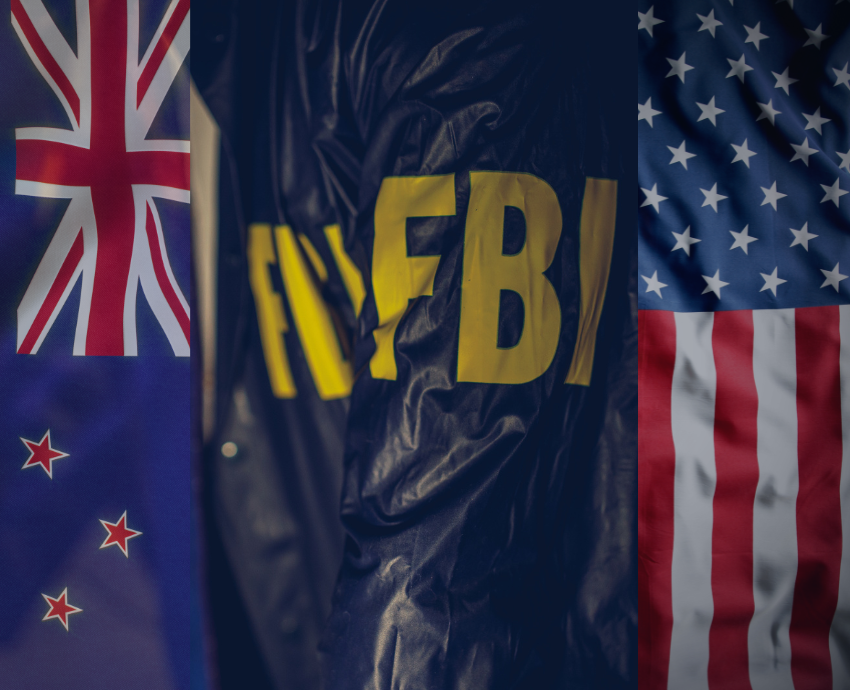
There is widespread opposition in Aotearoa New Zealand to the opening of a United States Federal Bureau of Investigation (FBI) office in the country’s capital, Pōneke/Wellington.
The US’s domestic law enforcement agency operates legal attaché offices — known as legats — in cities across the world.
It has had a presence in Aotearoa since 2017, managed out of its Canberra legat. The new standalone office, based in the US embassy, will oversee Aotearoa, Antarctica, Cook Islands, Niue, Samoa and Tonga.
Aotearoa’s right-wing coalition government gave no prior announcement of its plans to expand the FBI’s presence.
FBI director Kash Patel was spotted in the Beehive, Aotearoa’s parliamentary building, on July 30. Government officials were cagey when questioned by the media about his presence there. The US embassy also refused to acknowledge his visit at first.
It was later confirmed, however, that Patel met with government ministers as well as the heads of intelligence agencies and the police.
The FBI’s new office in Pōneke was announced on July 31, catching opposition parties — and the public — off guard.
In a statement, Patel highlighted collaboration between the US and Aotearoa on issues related to China as one of the key reasons for opening the office.
“Some of the most important global issues of our times are the ones that New Zealand and America work on together — countering the CCP [Chinese Communist Party] … countering the narcotics trade, working together against cyber-intrusions and ransomware operations and, most importantly, protecting our respective citizenry.”
The US and Aotearoa are both members of the “Five Eyes” intelligence sharing network, which also includes Australia, Britain and Canada.
In his statement, Patel said that the US expects its Five Eyes partners to “get after the fight and put the mission first”. For Aotearoa, this means explicitly aligning with the US in its build up to war against China.
Following the opening, foreign minister Winston Peters and defence minister Judith Collins tried to distance themselves from Patel’s anti-China rhetoric.
The government’s official statement emphasised combined efforts to tackle counter-terrorism, drug smuggling and online child exploitation. It did not mention China at all.
Collins said she did not expect any response from China to the news: “This is our country, our sovereign right to do what we do.”
Predictably, Patel’s comments did provoke a strong response from Aotearoa’s largest trading partner.
Chinese foreign ministry spokesperson Guo Jiakun said that Beijing was “shocked by the remarks” and the Chinese embassy in Pōneke likened them to a “Cold War mentality”.
Tensions between the US and China have been escalating since Donald Trump took office in January.
At a regional conference in Singapore in May, US defence secretary Pete Hegseth claimed that “the threat China poses is real”. He urged Indo-Pacific countries to raise their military spending to 5% of gross domestic product.
After the new office was announced, Te Pati Māori, the country’s indigenous party, launched a petition to “Say no to the FBI here in Aotearoa”.
It cited concerns that the FBI’s increased presence is part of a wider agenda to expand US spy capabilities in the Pacific and influence domestic affairs.
It also highlighted the lack of transparency by the coalition government, which is yet to provide any details about the FBI’s role, powers, or oversight in Aotearoa.
The Green Party’s intelligence spokesperson Teanau Tuiono said the country “shouldn’t be allowing foreign powers to set up shop”. He also reiterated the Greens’ position that Aotearoa should exit Five Eyes.
“We should step away from Five Eyes … with the chaotic nature of the Trump regime, more and more people around the world are looking to build alliances in other ways.”
While Patel was in Aotearoa it was revealed by Australia’s ABC that he’d held a secretive meeting with Australian home affairs minister Tony Burke on Gadigal Country/Sydney, on July 27.
David Shoebridge, the Australian Greens’ home affairs spokesperson, called on Burke to provide more information about what was discussed, saying the Australian public “has an interest in knowing who our minister for home affairs is meeting with and why”.
The FBI has a long history of repressing dissent in the US. Since it was created in the early 20th century, it has surveiled and infiltrated organisations that it perceives to be subversive.
Groups that have been targeted include anarchist, labour, indigenous, civil rights, anti-war and left-wing movements.
The agency is currently being led by an increasingly authoritarian Trump administration. It is playing an integral role in the mass detention and deportation of immigrants alongside Immigration and Customs Enforcement.
It is also involved in the persecution of student activists who oppose the genocide in Gaza.
History shows us that the FBI isn’t entrenching its presence in Aotearoa for the benefit of its people. Rather, it is there to enforce the strategic and geopolitical goals of the US empire.